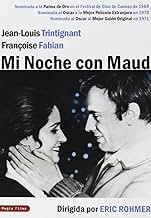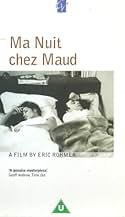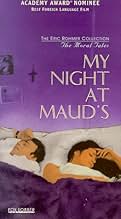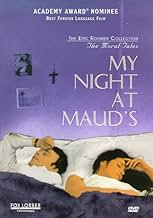Bei der Heiligen Messe erspäht Jean-Louis die schöne Francoise und schwört sich, sie zu heiraten. Doch noch bevor er ein Treffen arrangieren kann, bittet ihn sein alter Freund Vidal, die Wit... Alles lesenBei der Heiligen Messe erspäht Jean-Louis die schöne Francoise und schwört sich, sie zu heiraten. Doch noch bevor er ein Treffen arrangieren kann, bittet ihn sein alter Freund Vidal, die Witwe Maud zu besuchen.Bei der Heiligen Messe erspäht Jean-Louis die schöne Francoise und schwört sich, sie zu heiraten. Doch noch bevor er ein Treffen arrangieren kann, bittet ihn sein alter Freund Vidal, die Witwe Maud zu besuchen.
- Regie
- Drehbuch
- Hauptbesetzung
- Für 2 Oscars nominiert
- 6 Gewinne & 6 Nominierungen insgesamt
Empfohlene Bewertungen
"My Night at Maud's" is a spectacular work of art, which mainly consists of the intelligent discussion that goes on in the apartment of a woman named Maud over the coarse of one night. Of course, plenty of other things happen as well, but most of the film takes place during this one long discussion. Joining Maud is the main character, Jean-Louis, a Catholic man who seems to be in love with a woman (named Françoise, who becomes more of a major character later in the film), but hides it from Maude and his Marxist friend Vidal.
The film is an hour and 50 minutes of watching these wonderful characters talk and talk about various things, mainly things dealing with religion, love, etc. While a film almost entirely consisted of various characters chattering away may sound boring, it really isn't, mainly because the talking is so much fun (and really interesting) to listen to!
The film is also beautiful to look at, with gorgeous, black and white cinematography that really enhances the pretty cold tone of the film.
A really great piece of filmmaking!
Eric Rohmer's film is full of dialogue. The characters talk and talk, often so intellectually that I had trouble keeping up. But the talk is interesting and intriguing. The main theme (it appeared to me, anyway) is the value of faith in a world where the likelihood of heaven is becoming increasingly unlikely. Jean-Louis, a former ladies man, fights his urges when Maud invites him into her bed. He eventually climbs in, feeling the cold, and begins to kiss her. He eventually pulls away, looking almost angry with himself. He obviously feels that an eternity in heaven, however unlikely the idea is, is worth more than a moment of weakness and happiness.
The dialogue-heavy scenes may not appeal to everyone, it can at times be difficult to engage with the film and bourgeois characters. But it is richly rewarding and a highly intelligent character study. The film has an almost love/hate attitude to the idea of Christianity in a similar way to many of Bergman's greatest films. One of the most intellectually stimulating films of the French New Wave movement.
www.the-wrath-of-blog.blogspot.com
Two men, Jean-Louis and Vidal meet again after 15 years. They decide to go to visit Vidal's friend, Maud. In Maud's apartment the group of three have interesting discussions about Pascal, philosophy, moral and religion. What makes these discussions so interesting is the difference of Vidal, Jean-Louis and Maud. Jean-Louis is a catholic who believes in the holiness of man. Vidal is a Marxist who replaces God with history, he believes in history instead of God. Maud is an atheist, who believes in true short-term happiness. When Vidal leaves the apartment, Jean-Louis gets to a moral dilemma.
Jean-Louis talks a lot about a young blond woman he saw in church, Francoise. He doesn't know anything about her, but she represents religious and an ideal woman to him. Where Maud is the opposite to him. Jean-Louis doesn't believe in short-term happiness. So as he spends the night at Maud's he gets to a moral dilemma. According to his religious beliefs he should resist the temptation of Maud. Again his lie to Francoise is Christian compassion, but it's also a desire to hide his dishonesty.
My Night at Maud's goes very deep. It's not just about what's on surface: the intellectual dialogs and the moral dilemmas. The intelligence of Rohmer goes much deeper. And that is what I like in his films, even if you don't understand everything, the films have something that make you watch them again and again. I'm 17 and when I walked into a dark theater to see this fine film, I was blown away. When the film is over, you have came from a moral journey. So Eric Rohmer's film, obviously doesn't just stop at being the battlefield of ideologies.
After Vidal leaves, Maud tells Jean-Louis about her marriage, her ex-husband's Catholic mistress, and the tragic end to her affair with the only man she truly loved. When he is persuaded to avoid a snowstorm and stay overnight, Jean-Louis has to overcome Maud's advances and his own temptations to remain faithful to his ideal mate, a blond, Catholic girl (Marie-Christine Barrault) he recently met at church.
This was the first film I'd seen by Eric Rohmer and it was a puzzle to penetrate the uniqueness of his style and rhythm. Rohmer presents his characters in very natural, almost mundane situations, and heightens the realism by using only natural sounds of the environment. On the surface, the film appears very simple but underneath there is much complexity. Jean-Louis is conflicted between his Catholic principles and his love of sensual pleasure. He lives in a world centered almost entirely on himself, engaging in much philosophizing about choice but never choosing. He operates out of how he "should" or "should not" act rather than out of his experience of what works. When life does not fit his pictures, he deceives himself with endless rationalizations. Through his experience with Maud, however, he is shaken out of need for complete self-control and discovers the epiphany of grace.
Rohmer has a light touch and employs intelligent and witty dialogue to bring his characters to life. In the process, he creates an impersonal elegance that is totally captivating. Rohmer doesn't set out to change our lives just to make us think, and in My Night at Maud's, he succeeds admirably.
Wusstest du schon
- WissenswertesJean-Louis Trintignant's character is never called by name in the entire film. He is shown in credits as "Jean-Louis."
- PatzerAfter the night spent at François' student apartment, Jean-Louis Trintignant and Françoise go to church and later talk. For a moment, the boom mic drops into view from the top.
- Zitate
Jean-Louis: Are you still a Marxist?
Vidal: Absolutely. For a Communist, Pascal's wager is very relevant today. Personally, I very much doubt that history has any meaning. Yet I wager that it has, so I'm in a Pascalian situation. Hypothesis A: Society and politics are meaningless. Hypothesis B: History has meaning. I'm not at all sure B is more likely to be true than A. More likely the reverse. Let's even suppose B has a 10% chance of being true and A has 80%. Nevertheless I have no choice but to opt for B, because only the hypothesis that history has meaning allows me to go on living. Suppose I bet on A, and B was true, despite the lesser odds. I'd have thrown away my life. So I must choose B to justify my life and actions. There's an 80% chance I'm wrong but that doesn't matter.
Jean-Louis: Mathematical hope. Potential gain divided by probability. With your hypothesis B, though the probability is slight, the possible gain is infinite. In your case, a meaning to life. In Pascal's, eternal salvation.
Vidal: It was Gorky, Lenin or maybe Mayakovsky who said about the Russian revolution that the situation forced them to choose the one chance in a thousand. Because hope became infinitely greater if you took that chance than if you didn't take it.
- VerbindungenFeatured in The 82nd Annual Academy Awards (2010)
Top-Auswahl
Details
- Erscheinungsdatum
- Herkunftsland
- Offizieller Standort
- Sprache
- Auch bekannt als
- My Night at Maud's
- Drehorte
- Produktionsfirmen
- Weitere beteiligte Unternehmen bei IMDbPro anzeigen
Box Office
- Weltweiter Bruttoertrag
- 11.088 $
- Laufzeit
- 1 Std. 50 Min.(110 min)
- Farbe
- Sound-Mix
- Seitenverhältnis
- 1.33 : 1


























